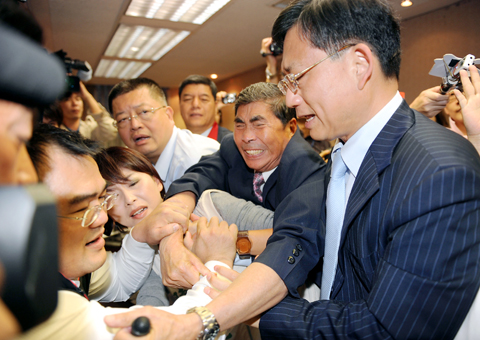The Democratic Progressive Party (DPP) caucus yesterday threatened to withhold cooperation on cross-party negotiations because a Chinese Nationalist Party (KMT)-dominated legislative committee rushed through a controversial bill that would recognize Chinese educational credentials and give Chinese students the legal right to study in Taiwan.
The bill will now proceed to the full-house session for further deliberation. The KMT government wants the bill passed before the start of the fall semester.
The afternoon session of the joint meeting of the Internal Administration Committee and the Education and Culture Committee almost ground a halt after DPP lawmakers sought to reverse the committee’s May 10 decision to push through the preliminary review of controversial legal revisions to the Act Governing the Relations Between the Peoples of the Taiwan Area and Mainland Area (台灣地區與大陸地區人民關係條例).

PHOTO: LO PEI-DER, TAIPEI TIMES
DPP lawmakers declined to confirm the minutes of the May 10 meeting, claiming some of the facts were inaccurate.
They occupied the convener’s podium and demanded the committee play the footage of the May 10 meeting for four points in question to substantiate their claim.
KMT lawmakers, however, said the DPP caucus could only reverse the bill if they agreed to confirm the minutes.
If the DPP caucus refused, the matter could only be dealt with at the plenary legislative session, they said.
The meeting convenor, KMT Legislator Wu Yu-sheng (吳育昇), finally accepted the DPP caucus’ demand, but the two sides could not reach a consensus after watching the video, which only had audio at the most contentious points of the May 10 session.
KMT Legislator Lin Hung-chih (林鴻池) blamed the loss of video portion of the recording on the DPP caucus’ “sabotage,” which drew more protest from DPP lawmakers.
While the DPP caucus said the May 10 meeting was null and void, the KMT caucus said the meeting had followed proper procedures.
Forty minutes into the debate, Wu declared the afternoon session had officially began, but his decision was not recognized by DPP lawmakers.
Wu also refused to play a video the DPP caucus claimed had clearer sound and picture.
Wu then declared that the minutes of the May 10 meeting were confirmed and that the DPP caucus’ proposal to reverse the decision to approve the preliminary review of the amendments to the cross-strait bill was flawed and therefore invalid.
He surprised everybody when he announced at 4:55pm that the bill had passed the committee review and then adjourned the meeting’s afternoon session.
Wu was quickly swarmed by DPP lawmakers and in the ensuring melee he lost balance at one point and fell.
He quickly left the area.
During the fracas, DPP caucus whip Chai Trong-rong (蔡同榮) called Wu a “bandit,” saying his actions were not the way legislative disputes should be handled.

Three Taiwanese airlines have prohibited passengers from packing Bluetooth earbuds and their charger cases in checked luggage. EVA Air and Uni Air said that Bluetooth earbuds and charger cases are categorized as portable electronic devices, which should be switched off if they are placed in checked luggage based on international aviation safety regulations. They must not be in standby or sleep mode. However, as charging would continue when earbuds are placed in the charger cases, which would contravene international aviation regulations, their cases must be carried as hand luggage, they said. Tigerair Taiwan said that earbud charger cases are equipped

Foreign travelers entering Taiwan on a short layover via Taiwan Taoyuan International Airport are receiving NT$600 gift vouchers from yesterday, the Tourism Administration said, adding that it hopes the incentive would boost tourism consumption at the airport. The program, which allows travelers holding non-Taiwan passports who enter the country during a layover of up to 24 hours to claim a voucher, aims to promote attractions at the airport, the agency said in a statement on Friday. To participate, travelers must sign up on the campaign Web site, the agency said. They can then present their passport and boarding pass for their connecting international

UNILATERAL MOVES: Officials have raised concerns that Beijing could try to exert economic control over Kinmen in a key development plan next year The Civil Aviation Administration (CAA) yesterday said that China has so far failed to provide any information about a new airport expected to open next year that is less than 10km from a Taiwanese airport, raising flight safety concerns. Xiamen Xiangan International Airport is only about 3km at its closest point from the islands in Kinmen County — the scene of on-off fighting during the Cold War — and construction work can be seen and heard clearly from the Taiwan side. In a written statement sent to Reuters, the CAA said that airports close to each other need detailed advanced

The age requirement for commercial pilots and airline transport pilots is to be lowered by two years, to 18 and 21 years respectively, to expand the pool of pilots in accordance with international standards, the Ministry of Transportation and Communications announced today. The changes are part of amendments to articles 93, 119 and 121 of the Regulations Governing Licenses and Ratings for Airmen (航空人員檢定給證管理規則). The amendments take into account age requirements for aviation personnel certification in the Convention on International Civil Aviation and EU’s aviation safety regulations, as well as the practical needs of managing aviation personnel licensing, the ministry said. The ministry